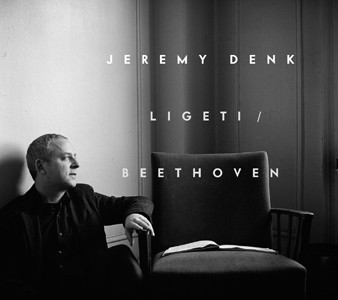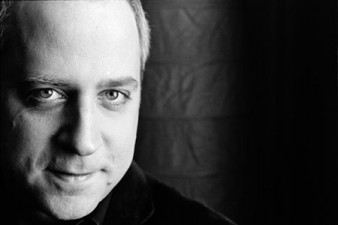Classical CD Review: Jeremy Denk’s Ligeti/Beethoven (Nonesuch)
If you find classical music to be a vibrant, living thing in which inventive pairings and convincing realizations of music of the distant and recent past can speak in fresh and vital ways to the present, Jeremy Denk is your man and this is your CD.
By Jonathan Blumhofer
Sometimes it takes a while for music, regardless of how good it might be, to gain wide acceptance. In an entry on his ever-engaging blog, pianist Jeremy Denk relates the tale of being questioned, post-concert, by an audience member incredulous that anyone would be interested in buying—let alone making—a recording of György Ligeti’s hyper-complex piano Etudes: “You’re saying . . . there’s a market for that sort of thing?” the man asked. Not that it’s the raison d’etre for making these things, but now we get to find out: Mr. Denk’s debut album for Nonesuch, featuring the first two books of Ligeti’s Etudes, paired with Beethoven’s equally demanding final piano sonata (op. 111), hits the market on May 15th.
Mr. Denk is one of an increasing number of technically brilliant and musically astute pianists who are regularly drawing interesting parallels between complex contemporary scores and the canons of the standard repertoire. Perhaps his nearest likeness is the superb Pierre-Laurent Aimard, who has made a career exploring a huge range of repertoire, from Bach to Messiaen, in interesting juxtapositions. Like Mr. Aimard, Mr. Denk’s enthusiasm for new music is contagious. As a result, his interpretations of familiar fare are often anything but commonplace, filled with unexpected insights and white-hot energy.
So it is with this recording, and, to some, that might prove a bit unsettling. If, like the character Mr. Denk encountered, classical music is, for you, a dead art that ends sometime around 1900, consists of little more than a greatest-hits parade of tunes by the three B’s and a few others, and has little use but to serve as an easy chair for the ears, then you can stop reading now—this recording isn’t for you. If, however, you find classical music to be a vibrant, living thing in which inventive pairings and convincing realizations of music of the distant and recent past can speak in fresh and vital ways to the present, Mr. Denk is your man and this is your CD.
Ligeti wrote three books of Etudes between 1985 and 2001. As Mr. Denk observes in his liner notes, they span an enormous stylistic and technical range, from utmost simplicity to “unimaginable complexity,” and stand as, perhaps, the most significant contributions to the solo piano literature of the second half of the twentieth century. Written, as they were, over the last two decades of Ligeti’s life, the Etudes reflect a number of the widely varied musical interests he held at the time, particularly fascinations with Central African polyrhythms and Conlon Nancarrow’s machine-like studies for player-piano.
This is not to say that the Etudes are mere mechanical exercises: yes, they are formidably difficult, both technically and expressively, but there is a strong lyrical impulse that runs through them, as well as a great sense of fluctuating, musical drama. In the best performances (and recordings) of the Etudes, all of this comes across, and this CD is one of those. Now we can add Mr. Denk’s name to a prestigious list of Ligeti interpreters that already includes Mr. Aimard, Fredrik Ullen, and Gianluca Cascioli.
Mr. Denk’s performance holds nothing back: he launches into Book 1’s opening Désordre with a manic energy that is simply astounding and never lets up. This etude is Ligeti at his most fearsomely complex, but Mr. Denk’s playing is no jumble of noise: he manages to enunciate and make something musical of each voice. This is also true of Touches bloquées and Fanfares, two somewhat lighter and darkly humorous etudes from the first book, and Fém and Vertige in the second. In contrast, the slower movements, Cordes à vide, Arc-en-ciel, and En suspens among them, unfold with effortless clarity, while the first book’s finale, Automne à Varsovie, is an essay in wistful virtuosity.
Sandwiched in between the Ligeti selections is Beethoven’s spectacularly unconventional op. 111 piano sonata. If there’s any nineteenth-century composer whose music doesn’t need to be paired with a major twentieth-century score in order to sound unique, it’s the perpetually fresh Beethoven. And, indeed, Mr. Denk turns in an interpretation of this peculiar score that is fully attuned to Beethoven’s expressive extremes, with a driven account of its neo-Baroque first movement and a sensitively paced reading of the finale. Mr. Denk’s ability to draw out the long melodic phrase is on full display in this last movement, too, where he manages a powerful reading of one of Beethoven’s most deeply felt, spiritual essays.
The pairing of pieces on this album brings out several interesting textural and expressive connections between the seemingly dissimilar musical languages of Beethoven and Ligeti. Listen, for instance, to how the gentle rustlings of Ligeti’s Galamb borong (an ode to Gamelan music) seem to flow out of the transcendent close of the Sonata’s last movement. Or how the granitic rhythms of the Beethoven’s first movement seem to foreshadow the pulsing energy of Désordre and Der Zauberlehrling.
Then there’s the whole issue of virtuosity as a means to an expressive end: Beethoven’s Sonata makes huge technical demands while exploring the ever-widening range of the keyboard (literally—he dramatically emphasized what were at the time the extreme ranges of the instrument in the first movement) while Ligeti seemed to explode the piano into a completely new keyboard instrument—just listen to the awesome final track, L’escalier du diable, and I think you’ll hear what I mean. This is a revelatory CD on several levels.
Kudos to Nonesuch for, first, signing Mr. Denk, and, second, committing to this challenging, well-conceived program. Of course, inventive programming is nothing new for Nonesuch, arguably the model major record label, whose roster ranges from Audra McDonald to Björk, Joni Mitchell to John Adams, and Richard Goode to, now, Mr. Denk. The recording (produced, mixed, and mastered by Adam Abeshouse) features good balance in its overall sound and fine textural clarity.
At the end of the day, this album isn’t about technical prowess but profound musicianship, though it doesn’t hurt that Mr. Denk possesses both in droves. He’s completely committed to this repertoire and utterly convincing in his performance of it, making this perhaps the most important classical recording yet of 2012.


